12.11.2006
12.02.2006
The Face of New Media.
After checking out a few videos on their site--www.lonelygirl15.com/ I'm not sure I understand how their format would translate with different genres? In particular I'm thinking about how their typical episodes last roughly 2 1/2 minutes, and are released every couple of days. This clearly equal low production value, but take it past the "dear diary" format and I'm thinking there would have to be loads of changes. Also, while I can see how some of the lighting, props, camerawork, etc. would have to be downsized for the average computer screen I think some cinematic features should be preserved. Just case it's on the web doesn't mean it has to be low budg and guerilla-like. On the other hand what do I know? The amount of comments the lonelygirl15 eps. get is pretty amazing averaging about 300 comments each time, so we're talking about at minimum 1,000 unique hits each week (and I know I'm lowballing that figure big time). Clearly the interweb masses have spoken.
11.28.2006
When capturing the eye matters.


Just finished watching two movies that I think are doing really spectacular visual tricks in film worth pointing out. They've got me thinking about how film is an attempt at marrying verbal narratives with visual ones, and just how rare it is when these two goals actually meet. Now, arguably the two films I want to write about--Water and 2046 don't necessarily achieve both of these. However, their visuals are so arresting that I found myself obsessed with each shot, which is something I've never been able to say about a movie before.
First off, it's worth noting who the cinematographers are behind these projects although directors Deepa Mehta and Wong Kar Wai deserve a great deal of credit for how their projects turned out. In 2046 it's Christopher Doyle who, based on a quick IMDB scan is probably best known for his work on Hero, and with Water it's Giles Nuttgens who was behind the other two films in Mehta's trilogy and most frighteningly was also behind the lens in Battlefield Earth. However, I'm willing to forgive given how beautifully he composed the shots in Water, a film that could've easily rested on its somewhat controversial narrative, but instead chose to capture Varanasi in a kind of constant pre-dawn glow that was stunning. The approach to visuals in both films is different, and this makes sense given the content of each film but what I really appreciate is the commitment to giving the viewer something really powerful visually, which, as silly as it sounds given the medium is really unusual. Of course I say 'unusual' but that's pretty strictly in the context of studio films. I haven't seen nearly enough alternative cinema to know what kind of visual palettes are out there, but suffice to say for popular cinema these two are pretty groundbreaking.
In getting down to the nitty gritty of their visual approaches I found Wong Kar Wai's really fascinating because he works without a script. Beyond the turmoil that probably creates for the actors I suspect it means he relies on visual depictions right off the bat to create mood. One of the great things about this film is how it shifts from a color saturated, sleek futuristic Hong Kong to a sepia toned nostalgic one set in the 60's without missing a beat. So much of the romance that pervades the film comes from his shot composition, which I can only describe as elegant. They are in no way flashy, overdone, or simplistic; instead they are composed so carefully with pure aesthetics in mind. Because there is a time shifting/dream like nature to the film there are a lot of shots where an object sits in the background, and we get something seemingly less significant like flowers blurred in the foreground. I think another way to describe Doyle's work is precise, which is not to say that the film is efficient by any means but it doesn't feed us unnecessary visual stimuli. I think Wong Kar Wai has enough confidence in his vision not to overstimulate while at the same time completely overwhelming the viewer with the power of film.
With Water I think there's a similar precision at work although some of the visual motifs used to depict romance feel more familiar and typical. The colors at work in these shots are intense and pure, which works really well given the stark white costumes of the widows. Because the narrative economy of the film is pretty spartan it is often the more inconsequential shots (to the storyline) that carry the most weight. There are phenomenal images of rain, lakes, and small beaches that make the geography of the story present in the film. I think a story that has the emotional and political impact of Water is clearly one that needs to be told, but when we are treated to a true cinematic experience in which the director and their crew are clearly interested in maximizing how that narrative is delivered we're lucky.
The question of how to credit visual work in film is interested because it is a collaborative project, and clearly no one person is responsible for everything that we get. I tend to give the director most of the credit, and that's probably not fair, although the title of auteur is one used frequently with both Wong Kar Wai and Deepa Mehta. I bow down to both of them for giving me something great to wrap my brain and my eyes around.
10.28.2006
The Sens(ibility) of Inland Empire
So, to be fair I missed the first forty minutes due to a last minute meeting but for a movie that finished up at 172 minutes, and was fairly incomprehensible in the 132 minutes that I did catch I don't feel like I missed out on much. Was it amazing and mind blowing you ask? Is Lynch's foray into DV opening up the medium? Was he able to outdo the weirdness that was cowboy and the midget from Mulholland Drive? Shockingly, the answer to all of these questions is yes, and while I'm not sure I saw a good movie or a movie that I enjoyed I did get to see David Lynch, Laura Dern, and Justin Theroux a mere 10 feet in front of me!
As for the movie I'm not sure I could or want to try break it down narratively. I'm more interested in the questions it raised for me more generally. One of the interesting questions that cropped up during the Q&A after the movie was whether the film could come together in a coherent form for the viewer? To which Lynch (rather charmingly I thought) responded "Of course". I now actually believe he sees his visions as pretty clear and comprehensible, which I suppose any artist would; otherwise why bother conveying it. He did mention that there was a dream logic at work, and loose a term as that is I think it's an apt one for the narrative disjunction in his films. The one thing we can all confidently say about our dreams is that something is threading them together, we just can't always articulate what that is.
As a viewer I wonder what to do with a film like Inland Empire that has a couple of identifiable themes (simultaneous seduction and ephemerality of Hollywood, subjection and objectification of women) but it's not really clear what he's doing with them. In this case Laura Dern plays multiple characters who start and end with dreams of success in Hollywood. In between are a slew of characters that stumble in and out of her life and her dreams with a couple of male characters being exceptionally crude and offensive. One thing I question consistently with a director like Lynch, who clearly aims to break new aesthetic ground in cinema is how the audience should treat the final project? Is it a piece in a larger artistic endeavor or can we pick it apart on its own merits and failures? I think this is especially important because we are always looking for people to push boundaries and make something new, but I think the key here is relevance. I'm not sure he always achieves it.
As far as form goes the quality of DV is pretty weak. Although there were a plethora of interesting shots, set pieces, and music the overall look of it was pretty grainy and mottled. However, both Laura Dern and Justin Theroux talked about the kind of freedom they enjoyed as actors, because the camera was always rolling, and they didn't have to reshoot from multiple angles. I could see this being a really great tool for directors and actors alike, and changing the medium for those very reasons.
I will just say that despite how confusing I find Lynch his influence is undeniable. After watching a few episodes of Lost recently it's clear how much it benefitted from Twin Peaks.
~The end.
10.26.2006
Bow down to Borat

So, if the premiere is any indication this movie is going to be diggety dope. That's right EW it will be both the funniest and most offensive movie out this year. Those things actually co-exist pretty easily.
10.18.2006
Hume or Kames? You decide.
Or is it as Scottish philosopher David Hume would have us believe...
"Beauty is no quality in things themselves, It exists merely in the mind which contemplates them; and each mind perceives a different beauty.”
According to Gladwell's profile the motley trio of Epagogix is on the side of Kames--not only can we quanitfy these things, but we should, and make box office numbers the literal bottom line of filmmaking.
While I'm equal parts fascinated and horrified by this approach (the fascination really stems from my lack of quant skills) what I'm really curious about is how much the little factors play into the success of a film. The example in the piece cites The Interpreter, Sydney Pollack's relatively unsuccessful film set in the U.N. According to Epagogix the choice to set it in a pseudo African country, the inability to capitalize on the romance of the U.N. as a location(what the frak? since when did bureaucrats equal romance?), and too much ambiguity made this film a failure.
So, is it really this logical? A good film is quantifiable? The article noted this approach is already used with relative success in music, but I wonder if this could or would ever extend to other artistic modes? I suppose music and film are the most overtly commercial, and thus lend themselves to this approach pretty easily but I still can't accept this notion. Ultimately I think it suggests that there is no ambiguity in art and that, as anyone who has ever been overwhelmed, perplexed, annoyed, shocked, etc. by a movie or a piece of music will tell you is just not true.
10.15.2006
Been to the movies lately? Nah, but I'm not sure I could tell you why.
Okay, so I'm not diagnosing it as an official problem yet but I haven't seen a movie in months. Well, that's not exactly true because I did recently attend a MAJOR movie event (soon to be blooged about), but it was an anomaly in an otherwise dry period for me. So, naturally being the curious person that I am I have to ask myself why? Why would a person who loves movies stay away from them for the last few months? It's not even like it's the summer blockbuster season. There are actually good, even great things out right now and I just haven't been motivated to see them.
Even more strange I find myself not wanting to see the movies that people rave about/I'm confident will be good. Exhibit A--Little Miss Sunshine, a movie that had quality entertainment written all over it. The trailer looked great, it had a great cast, and everyone I know who saw it said it was good, but the more I heard about it the less I wanted to see it. Now, I chalk some of this up to a general desire right now to be perverse, but I think there is a deeper reason for my lack of movie interest. Part of it is my larger commitment to television right now (I feel like the big networks have rolled out one of the best seasons ever content-wise) and the other part of it is a growing fear that every movie I want to see won't really be satisfying.
Exhibit B--The Science of Sleep, a movie I've been reading tons about and whose director I adore. So, why haven't I seen it yet despite the fact it's playing roughly 1/4 mile away from where I am right now? The answer is as simple as it is silly: The longer I go without seeing a movie the more fear I have about the one that will break the spell. Will it be good enough? Will it entertain? Will it re-energize my love for movies?
Well, you can see the conondrum here...and I suspect there is only way to solve this one. Tomorrow I'm going to the movies, and hopefully I'm going to laugh, cry, and fall in love with them all over again.
9.21.2006
T-10
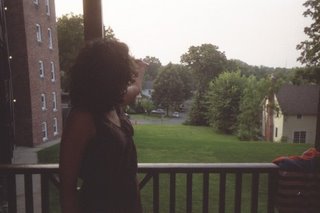
10. an ode to the movies made in my favorite texas city. the one i'm most proud of? toss up between the chainsaw massacre and varsity blues...that's what i call texas culture.
9. the best music to movie crossover...oh wait this is never a good idea
8. best tv to movie crossover . or the most tragic one depending on whether you loved her television work?
7. all jane austen adaptations cause the only thing better then reading austen is watching austen. how many authors can you say that about?
6. 1/2 of wes anderson's work (the first half in case you're wondering)
5. batman begins ( i think this blog is actually a poorly concealed ode to that movie)
4. every critic that's ever written something amazing. lane, thomson, scott, dargis, turan, chocano, and zacarek.
3. bars that play movies on a giant screen.
2. anyone i've ever talked movies with.
1. 25 years of life - 7 (years when i wasn't watching movies due to time devoted to developing brain--i.e. reading, writing, hand-eye coordination, etc. and living in a country w/ access to only french and arabic stuff) = 19 years of movies. best.years.ever.
9.19.2006
....and counting
18. my own brief attempt at movie making, in which i learned no editing equipment/knowledge of editing means no movie will be made.
17. during a particularly dry fund summer i (and others who will remain nameless) was desperate for the movies and tried to swing the kid ticket, which really should've worked given how young i'm often mistaken for being. it didn't work and yes we were ashamed.
16. the metacritic stinker alert--this list is pretty revolting
15. discovering that jlo and mm are perfectly suited for a romantic comedy together...they have never made anything as good as this and they never will....
14. trailers (i defer to apple on this)
13. a movie so bad i actually walked out of the theater--gattaca. also, you have to love something that can provoke that serious a reaction out of you.
12. my own special day of torture as an extra in a movie...i was promised a SAG card, i swear.
11. SXSW the hippest festival for movies cause they're not front and center.
10 more to go...
9.17.2006
To the quarter life....
25. Netflix--cause what's better for a lazy person then getting movies delivered to your door?
24. Quoting lines--yep, it's social insiderism at its worse. people quoting without reference and expecting a reaction (often the next line in the movie, but sometimes a laugh will suffice) because they get cultural moments. guilty.
23. snickering my way through Titanic, and my first realization that Hollywood romances are weak. sidebar--whose genius idea was it to get James Cameron to direct one? i don't remember many tender moments from T1.
22. seeing the English Patient at 15, and being firmly convinced that not only was this a clear sign of my sophisticated taste as none of my friends had seen it, but also getting the thrill of sneaking into an R rated movie.
21. the failed triple feature...one night...three movies...two of them were bad and sustenance was low by the third one. this one's really a testament to my friend A and I who were intrepid enough to try, though failing and literally falling asleep on different rows by midnight.
20. going to MGM studios when i was 13 and learning that they made fire with sheets and fans--way too much for my formative mind to handle.
okay, i'm running out of time today but more to come.
9.14.2006
A movie about my life...in three parts.
Yes, that's right...if you follow this thread of logic I somehow made the transition from young innocent child to dissolusioned homeless twenty-something with a leg injury that involves self-medication and denial, and all of this will end with animal entrails flying all over the place as I attempt to preserve sanity.
Proof that art mimics life?
8.25.2006
My Dark Knight in shining armour

The following is a review Rekha and I wrote for the class. No, Batman Begins isn't a new film. No, this isn't a new review. Why post it? Because we can, and because we love it. The movie. The review. We love them both. And you should to. Here's why:
What is the difference between a man driven by justice and a man driven by revenge? Writer/director Christopher Nolan attempts to answer this question in his resurrection of the Batman franchise. Batman Begins does just what it says — it traces the birth of Batman out of the broken spirit of a young, parentless Bruce Wayne. Unlike the previous incarnations variously portrayed by Michael Keaton, Val Kilmer, and George Clooney, Christian’s Bale’s Batman is a profoundly realistic character.
Freed from the camp that has been the creative ethos of nearly every portrayal of the caped crusader, Nolan instead embraces the darker, more human side to Batman. What is particularly innovative about his approach is that we get a back-story for Bruce Wayne that does not feel at all contrived. The film begins with a series of flashbacks to Wayne’s youth, juxtaposing the horrifying murders of his parents with the anchorless and vengeful young man he has become.
At a mountain retreat in the Himalayas Wayne encounters Ra’s Al Ghuhl (Ken Watanabe) and the League of Shadows, a group devoted to the erradication of crime through vengeance. As he immerses Bruce in martial arts training, mentor Henri Ducard (Liam Neeson) presses Bruce to relive his worst fears in order “to become more than a man, to become a legend”. And in this fashion Nolan’s storytelling establishes Batman’s physical acumen even as Bruce Wayne learns to harness his fear and convert it in to something more productive.
Upon returning to Gotham, Nolan reveals the nuts and bolts behind Batman’s accoutrement with the help of beloved butler Alfred (Michael Caine) and Wayne Enterprises’ Applied Science guru Lucius Fox (Morgan Freeman), including the Batcave, the Batmobile, and the Batsuit. What follows is a web of crimes, masterminded by Gotham’s resident thug Carmine Falconi (Tom Wilkinson) culminating in a face off between justice and vengeance. Struggling to listen to his own better angels, Bruce attempts to right the system that produces the desperation that led to the murder of his parents. Forsaking the easy relief of revenge on Falconi, Batman maintains hope that the restoration of justice can redeem Gotham. Aiding his struggle are Police Officer Gordon (Gary Oldman) and lawyer and childhood friend Rachel Dawes (Katie Holmes).
Visually, this film departs from Tim Burton’s inaugural vision of Gotham as merely opaque, a comic book enviornoment that is both two dimensional and heavily framed. Nolan’s departure, while remaining dark, allows characters and locations the depth to resonate as actual people and spaces — instead of convenient fictions. For example, rather than a non-descript black hole, the Batcave is a cave, replete with dripping stalagtites and swarms of furry bats. This visual trick allows us to see the man of Batman and the world he inhabits beyond the legend we are so familiar with.
Nothing feels more innovative about this film than the choice to cast Christian Bale in the lead dual roles of Bruce Wayne and Batman, two entirely distinct physical presences. Bale’s face is all sharp angles and smooth planes, giving him the dignified appearance of the aristocrat Bruce Wayne was born to be (also on perfect display in the role of Patrick Bateman in American Psycho). But when his jaw juts outward and his cheeks furrow in, Bale transcends the physical limits of the suit to become the seething, revenge-bound man in black. Michael Keaton, as the original Batman, was an equally unconventional choice to play the leading man, but where he relied on costumes and brooding, Bale embodies the torturous psychology of both Wayne and Batman.
Few superhero movies and comic adaptations achieve the transcendent awesomeness that Batman Begins appears to do so effortlessly. It’s rare the film that is able to marry franchise filmmaking with the kind of directorial weight Nolan brings, particularly in the genre of noir, where he is clearly at his best. The wide appeal of Batman Begins is not to be underestimated—fans of Nolan’s earlier Memento will appreciate the film’s commitment to narrative and character while comic book fans will appreciate seeing a favorite hero reclaimed from camp. But perhaps most appealingly, Batman Begins taps into an American ideal that we all have the potential to be our best selves with a little introspection and a lot of money.
8.22.2006
When viewing pleasure matters.
In the last 5 years when I believe my movie watching skills have been honed and I'm proud to say diversified this is what my location breakdown looks like:
- Corporate Theaters (i.e. Cinemark, AMC, etc.) 45% Most of these experiences have been good although some have better stadium seating then others, and most often have been over-air conditioned. However, despite that I probably experience my greatest rates of falling asleep in a movie in these conditions. Most recently, Superman and Miami Vice have fallen into this trap. Greatest advantage here is the double feature, which I haven't done in a while but it is one of life's greatest pleasures.
- Semi-Corporate Indie Theaters (i.e. Landmark, Greenway, and the Alamo Draft House) 12% Okay, these have usually been very good experiences in terms of the actual movie, but these venues suffer from half assed corporate ownership thus no stadium seating and often too hot or cold depending on season although in Houston I would say it's always hot outside and too cold inside. The falling asleep rate here is good...it rarely happens as I often initiate these outings, and thus feel obligated to committ to the movie.
- Full on independent theaters (only two that I've ever been to--both in Northampton) 5% These have been very positive experiences both in content and quality of viewing, which is interesting given the lack of resources devoted to viewing pleasure (definitely no stadium seating, or air flow of any kind here). But, these places have charm and that counts for a lot. Plus, while I've encountered a few obnoxious audience members nothing too bad, and nothing compared to the crowds you get at option #1.
- And finally--the home viewing experience, which I give an A+ despite some potential pitfalls. 27% So, there are obvious reasons that home is good...the snacks are better and cheaper, I can talk whenever I want and not feel bad about it, and of course the pause button is essential here. Also, the whole falling asleep thing is not as much of an issue nor is it as socially awkward if it happens (and by socially awkward i mean when you hit the deep rem sleep and deep breathing, sounds, etc. follow). Just for the record I rarely hit that stage of sleep in a movie, but it has happened.
As far as rating my favorite experience in all of these settings I'm not sure I can although I find option #1 is best suited for movies full of fluff or action. So for example, Batman Begins is as good as The Princess Diaries to me thanks to the giant theater. Option #2 is best suited for more serious movies that you're willing to drive a little farther for, and if ambience is a factor. So, for example I owe my love for Life Is Beautiful entirely to the River Oaks Landmark theater. As for option #3 it encompasses my most recent experiences of which there have been many, but I think seeing Head On at the Academy of Music was pretty awesome even if it was with a bunch of crazy German Studies academics. Option #4 really has too many memories to recount so, I won't, and instead I'll just say that I love all the places that I've seen movies in, and in the vein of my new statistically savvy self they've all made my life at least 80% better.
8.11.2006
Making a political movie without politics (here's looking at you Oliver Stone)


Although I haven't actually seen World Trade Center I have read the reviews, which as far as I'm concerned is good enough. The glowing reviews are disappointing, but no less then what I exepcted from a public that is still not prepared to think about September 11th outside of the context of patriotism. But, as much as I don't like Oliver Stone, and never had high expectations for this I'm disappointed with amount of sapiness that that this movie just ooooooozes. I mean the guy is in now way subtle, as was proven by the uber bombastic Wall Street, but if you have a huge production budget and a major studio behind you, and you get to be one of the first to make a movie about an event that is both incomprehensible, and stained in our memories you better do better then this cheese fest. I think it's irresponsible filmmaking , or just a wasted opportnity depending on how much you value film culture.
It did remind me though of a great movie I saw this year that does deal with political issues in a heavy complicated way--Cache by Michael Haneke. I think the movie was more of an intellectual exercise then an interesting narrative, but I think it was incredibly powerful in how it handled national issues by bringing them into private domestic space. I also think the surveillance stuff was really creepy, and got right at the immigrant space in France in a way that was innovative. Of course the real difference between these two (Stone and Haneke) is that one understands nuance, but I also think that one is more honest and more interested in dissecting people, which ultimately is a much more satisfying experience for the viewer. Because really--what's the point in making a political movie if you're going to make it devoid of politics?
7.18.2006
Being a critic means never having to say I'm sorry...
"So we’re damned if we don’t. And sometimes, also, if we do. When our breathless praise garlands advertisements for movies the public greets with a shrug, we look like suckers or shills. But these accusations would stick only if the job of the critic were to reflect, predict or influence the public taste.
That, however, is the job of the Hollywood studios, in particular of their marketing and publicity departments, and it is the professional duty of critics to be out of touch with — to be independent of — their concerns. These companies spend tens of millions of dollars to persuade you that the opening of a movie is a public event, a cultural experience you will want to be part of. The campaign of persuasion starts weeks or months — or, in the case of multisequel cash cows, years — before the tickets go on sale, with the goal of making their purchase a foregone conclusion by the time the first reviews appear. Sometimes it works and sometimes it doesn’t, but the judgment of critics almost never makes the difference between failure and success... "
I think to an audience like us the cultural experience of the film is embedded into the discourse surrounding the film (i.e. who made it, their aesthetic choices, studio intrigue, etc.) I don't think films exist in that kind of vacuum anymore, and the proof is in websites like metacritic.com and rottentomatoes.com, both good at providing numerical breakdowns of judgment, and both popular with audiences who like going to the movies, but who claim not to be concerned with judgment.
"So why review them? Why not let the market do its work, let the audience have its fun and occupy ourselves with the arcana — the art — we critics ostensibly prefer? The obvious answer is that art, or at least the kind of pleasure, wonder and surprise we associate with art, often pops out of commerce, and we want to be around to celebrate when it does and to complain when it doesn’t. But the deeper answer is that our love of movies is sometimes expressed as a mistrust of the people who make and sell them, and even of the people who see them. We take entertainment very seriously, which is to say that we don’t go to the movies for fun. Or for money. We do it for you."
I guess the final point to make here is that critics exist where culture mattters, and even as that notion evolves, and the division between high and low brow is maintained I still like thinking that there are people out there doing the heavy lifting.
6.26.2006
"Ask a black dude" + "I'm going to piss on you"= Chappelle's Show
So, back to why this show is smart. I think in one of the very first episodes he sort of throws out there how racist the world we live in is...and he goes on to make some really silly examples, but in this effortless way he has made something really murky very clear. I definitely attribute some of that to the power of comedy and it's way of getting at truth, but I give way more credit to Chappelle for making it the center of his show. I've also read a couple of things recently including a piece in Esquire about why he left the show. I imagine creative control, particulalry in a show designed around your own humor (which seems to me to be a lot of personal neuroses) would be hard to cede. Harder if you're ceding to a board of white men who know your demographic for their advertising revenue potential and little else. After reading the interview I'm more impressed with him for leaving, and for not willing to do a show with his name (read brand) but not his full control.
My favorite recurring sketch on the show is "Ask the Black Dude" mostly cause I think the guy answering the questions is playing it straight and saying the sort of in your face truth that's hard to hear. I also think the question of who's being the isolater/isolated when you feel compelled to ask these questions to someone "different" is tough. I mean I guess if you think you have the right to ask those questions your assume some inherent power, and of course you assume that you are the norm. I guess that's what makes these segments so clever...Chappelle's got a handle on the seduction of power.
ohhhhhh....snap
5.21.2006
Dear two cents students,

You probably don't read this blog anymore since our class is over, although I think you all secretly loved it. But, after looking at all of your cool final projects and having people check them out at the Writing Festival I just wanted to say good work! There was a really diverse range of interests and styles present in your writing. I'll leave you with cover of the movie I'm most looking forward to this summer...yeah, that's right it's going to be awesome.
p.s. kudos to the anal probes...you guys killed it in movie trivia, and proved what mental giants you truly are.
p.p.s. Also, if by chance any of you do end up becoming critics don't forget who helped you get there.
5.15.2006
It's up. It's rad. You love it.

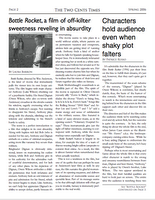








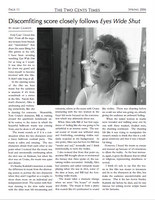

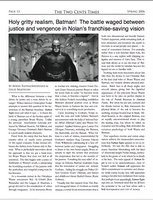
5.12.2006
5.09.2006
In case you missed it...

...and many of you did. Today's attendance in class, was, shall we say, lackluster. So let me take this opportunity to give a shout out to those who kept Rekha and I company between the hours of 4 and 6. Mary, Shana, Matt, Stuart, Simon, and Tyler--props to you, yo. Sarah and Dan, partial credit will be awarded.
For those of you who missed class--some of you notified us of your absence, some of you didn't. But all of you missed dancing polar bears. Dancing polar bears. You can't even find that kind of thing in a David Blaine special. It's really a bummer for you. You'll have to live with disappointment.
In all seriousness, missing class is a problem. That's why showing up and getting your butts in the seats is one of the primary determinants in whether or not you pass this class. But you knew that...
Next week's class, while lacking polar bears, will be MANDATORY if you'd like to pass the class. Since final projects are due (along with any and all late assignments), you must show up to turn in your project. Bloggers, this applies to you too, even though you won't be physically turning in any work.
Keep blogging and posting, and we'll see you next time.
5.08.2006
Going digital...
4.26.2006
"There's Fish for Everything"
Thoughts?
Gandhi & Scarface, together at last
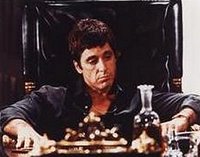 As Rekha and I mentioned, Pleasant Street Theater in Northampton will be showing 33 films in 31 days, beginning May 1. There are some movies definitely worth seeing. An odd mix...The Deer Hunter and Amelie? Brazil and Whale Rider? And don't forget Eternal Sunshine of the Spotless Mind on May 30. Yes, Mary, I'm talking to you.
As Rekha and I mentioned, Pleasant Street Theater in Northampton will be showing 33 films in 31 days, beginning May 1. There are some movies definitely worth seeing. An odd mix...The Deer Hunter and Amelie? Brazil and Whale Rider? And don't forget Eternal Sunshine of the Spotless Mind on May 30. Yes, Mary, I'm talking to you.
4.19.2006
When bad things happen to bad people....
In an piece in Salon by Jessica Hundley --
"In "American Psycho," Harron directs a delicately boned, elegantly dressed Christian Bale as Bret Easton Ellis' coldhearted killer. Bale plays the part with bored and haughty bemusement, moving through the film like a smugly satisfied cat. "American Psycho" is not a film one might expect to be directed by a woman, but it is Harron's feminine touch -- and her humor -- that keeps the film's brutal elements palatable. In a satirical take on '80s excess, Bale's rich kid has a sense of entitlement as large as his ego -- yet there's something in his snobbery that is appealing. We can laugh at his cruelty because Harron has created an effective film stereotype: the privileged white Ivy Leaguer every viewer loves to hate".
I'm not really sure this is a very complete thought on Mary Harron directing the movie--what is this feminine touch? Is it possible for a female director to escape a male aesthetic? I also wonder if the fetishization of Bateman is unique to her eye or just necessary for the adaptation?
And finally--as far as the music in the film goes Sarah Vowell has a really interesting take on it in yet another Salon article.
"Ellis writes deftly about people who shouldn't be doing what they're doing, and one way they live with themselves is by shutting off the silence that is the examined life's requisite. You cannot examine your life too closely if you've got "Walking on Sunshine" full blast on your Walkman, as serial killer Patrick Bateman (played by Christian Bale) does in the new screen adaptation of Ellis' "American Psycho." I always thought good people needed good music to make a good life, but do the bad-to-worse characters of Ellis' imagination need music to drown out the sound of their own consciences?"
So, for those of you who found the music intolerable-- here's your defense.
"The genius of director Mary Harron's film "American Psycho" is the way she juxtaposes Ellis' musical tirades into the action. In the movie, she has Bateman delivering his manifestos he's killing people. Harron's comic timing is impeccable. Now, when Bateman's talking up Huey Lewis and the News he's jabbering that their album "Sports" is "a personal statement about the band itself" as he ax-murders a guy. After he's finished the guy off, Bateman absorbs "Hip 2 Be Square" with blood all over his face; he lights a cigar, and -- something Ellis would probably never let him do -- actually listens to the song. Even though sometimes the reader feels like Ellis is letting Bateman get away with murder, the author punishes his protagonist: He has no peace; and despite the fact that Bateman shall have music wherever he goes, it's Collins' "Sussudio," which strikes me as punishment enough"
I'll end here by swearing that I don't write for Salon, and this is not just one big plug for them, but they do have some pretty great stuff.
4.16.2006
Polar icecaps? O-ver-rat-ed.
There's a new phenomenon of "user-generated content" on the rise. What does this mean? In places like myspace, it means building your pages to look how you want it to. In advertising, it means companies are letting the consumers suggest and dictate what an ad says or how it looks. Pretty smart, actually. It's a theory akin to voting on American Idol and market test research: let the consumers tell you how they want to be sold.
Of course, kids say the darnedest things. The obvious flipside to letting the consumers do the talking is that some of them might say things you don't like. In Chevy's recent campaign for their Tahoe SUV, they allow users to choose various scenes of the Tahoe driving, one of a few soundtracks, and they let users write the titles that come up on the screen. This has led to some fairly interesting commentary and ad-making. Matt, to me, this really is art. Fight the power. And then get the kids to soccer practice.
Oh, and here's another clip worth looking at when considering trailers. It won a contest to recut The Shining into a feel-good family film. How does editing and music make this classic horror into Mr. Mom? That may be the scariest thing of all...
4.14.2006
So, you liked the movie? Wait until you see the trailer!
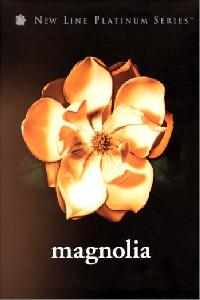
One thing that occured to me as we were watching a clip from Magnolia this week in class is the amazing phenomenon of movie trailers. When done right they can be brilliant, and in my humble opinion infinitely better then the movie they advertise. I know that they aren't always put together by the director, but the reason I bring Magnolia up is because it has one of the best trailers I've ever seen for a movie. In fact, I think it was much better then the movie it advertised, which I recognize is a weird thing to say but here's why. I think the concept behind the movie is clever, and even experimental in some regards but the finished product is muddled, too long, and incomprehensible at points. The trailer on the other hand is a sleek piece of filmmaking (P.T. Anderson actually put the trailer together) with NO voice overs and Aimee Man's brilliant music enhancing what looks like some powerful scenes. It's too bad it doesn't all come together in the movie, but it doesn't mean that the trailer can't stand alone. So, I tried really hard to dig up the trailer, but with no success. Apparently archiving trailers is not at all the thing. Can I say that trailers stand alone as their own brilliant subsection of film? That they make nods to a plotline, give us the best acting and lines of the film, and do it all in 2-3 minutes? That at times they falsely advertise a film to persuade us it's better in clips and cuts then it is in full lenghth? Sure I can cause it's my post!
4.13.2006
I'm a loser, baby.
 Today's New York Times featured a piece by Virginia Heffernan that I found fascinating. It was concerned some new DVDs produced by Sesame Street for children under two years old. Oddly enough, some people don't like the idea of 3-month-old babies watching TV. The article is great, but even more interesting to me was the beginning of the article and some philosophizing on the stigma attached to television viewing. Observe:
Today's New York Times featured a piece by Virginia Heffernan that I found fascinating. It was concerned some new DVDs produced by Sesame Street for children under two years old. Oddly enough, some people don't like the idea of 3-month-old babies watching TV. The article is great, but even more interesting to me was the beginning of the article and some philosophizing on the stigma attached to television viewing. Observe:Self-doubt stymies the television watcher. Go to the symphony, the opera, the theater or the ballet and you're rewarded with a feeling of cultural accomplishment; if you like the production, you feel improved, and if you dislike it, you feel superior. Either way, you've won.
But television is not for winners. Television is for low, exhausted potato people who slouch, and for their children, who are plopped in front of it. Slouchers and ploppers, that's us — and we tend to incur the wrath of more upright types. But, in spite of that generalized scorn and the self-doubt it induces, the loser in all of us plainly can't stop watching television, partly because it affords an opportunity, in our hard-driving world, to waste time and energy flagrantly, to live profligately, to forgo winning. Moreover, great television shows capitalize on this defenseless state, allowing us to grieve, pass imaginatively into unusual mental states, laugh off anxieties, lose ourselves. Television, in fact — to give the experience a paradoxical kind of dignity — encourages us to practice the great art of losing.
I think there's something so on-point about this theory. I praise TV all the live-long day, and yet I'm not just praising it, but justifying my behavior. As Rekha knows, I always say that "reading is my job. I need to watch TV to know I'm not working." But this is a rationalization, isn't it? Do I need to do that? I certainly don't justify my time at the theater, reading books, or browsing art galleries. Not that I actually do those things. I might miss Lost. But if I did do those things, I don't think I'd feel compelled to explain their merits to the world.
This sounds a bit like therapy. But don't worry about me, I'll be fine.
4.12.2006
Nobody loves a list more then me (!)
The Gilmore Girls--sure the dialogue is too witty and reference laden, bordering on annoying at times, but it does feature two smart women who get to work, go to school, fight, fall in love and never have to face being the object of the joke.
Everwood--again great writing here, and amazingly enough for a show focused on teenagers really great acting.
Veronica Mars--hands down the best show on tv right now for reasons already mentioned and two words--Daddy Mars.
TV-- Love it, Embrace it, Live it.
4.11.2006
Ain't no rot in my brain, yo.
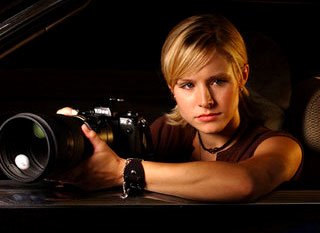 So today Rekha and I broached the topic of television. True, this is a film review class. True, there's lots of crap on TV. True, the youth of America are in danger because of the evil box. Does that cover it? Good. Because I love TV, and I'm here to tell you that you should too.
So today Rekha and I broached the topic of television. True, this is a film review class. True, there's lots of crap on TV. True, the youth of America are in danger because of the evil box. Does that cover it? Good. Because I love TV, and I'm here to tell you that you should too.There are a ton of great reasons to love TV. When considering the quality and depth of storytelling available to television writers, it's easy to see how TV has the potential to work in ways film can't. Characters' relationships, personalities, and weaknesses can be established early and cashed in on later. Story arcs can be stretched over several episodes, keeping the dramatic tension over weeks, not hours. And finally, writers have the ability to assess viewer response and alter content. If something doesn't work immediately, it can be tweaked, new stars can be added, and new directors can be brought in. Shows that take advantage of their medium really have the capacity to tell stories other forms just can't. So with that in mind, here's a list of essentials, as far as I'm concerned: The West Wing (Seasons 1-4), Veronica Mars, Lost.
* The West Wing: This is a no-brainer. It's simply the smartest, wittiest, fastest-moving, most engaging and relevant thing that's ever been on television. Period.
* Veronica Mars: This one is brilliant for its misdirection. To the untrained, disinterested eye, it may seem like just another show about a girl living in SoCal being snarky. And she is. She's the ULTIMATE snarky girl in SoCal. But she also solves crime while being snarky, clever, and just plain cool. As our friends at amazon.com say, "Veronica Mars is The O.C. as penned by Raymond Chandler. Veronica is Nancy Drew by way of Lauren Bacall, while Neptune makes Peyton Place look like Mayberry."

* Lost: As I mentioned in class, this show is X-Files-meets-Gilligan's Island-meets-awesome. The sci-fi, conspiracy-theory laden, character-driven drama raises as many questions as it answers, some deep, some merely entertaining. The tone and content bounces between high and low, and the way each episode focuses on a single character's backstory pre-plane crash keeps the plots fresh and ensures that we don't have to look at the same dirty people in their fraying clothes every minute of every episode.
These shows are the places to start. I know it sounds like hard work, and maybe you don't think you have the time to devote to such a noble calling, but trust me. It will all be worth the sacrifice.
4.09.2006
And the Oscar goes to....
4.08.2006
POW! WAM! SOK!
Christian Bale = Greatest. Batman. Ever. Discuss.
4.07.2006
It's the Writing, Stupid
4.05.2006
Mass Multicultural Film Festival
4.03.2006
Movie Capital
Experimental Writing
Also, if you'd like to extend class discussions here, that could be another use for this. It would also be way cooler than WebCT, and feel less like homework and more like mindless internet time-suckage. Which is awesome. So, anyone want to keep talking about Bottlerocket? Or genre? Or the gender in film? Let's do it here. Or not. Whatever.
